Fuel cells offer a compelling solution for home energy storage. You'll benefit from efficient energy conversion, clean and quiet operation, and reliable backup power. They reduce your dependence on the grid, leading to long-term cost savings. Fuel cells are scalable, fitting various home sizes, and integrate seamlessly with renewable sources. You'll have fuel flexibility options and contribute to environmental sustainability. With minimal emissions and high efficiency rates, fuel cells provide a forward-thinking approach to powering your home. Discover how this innovative technology can revolutionize your household energy management and independence.
Efficient Energy Conversion
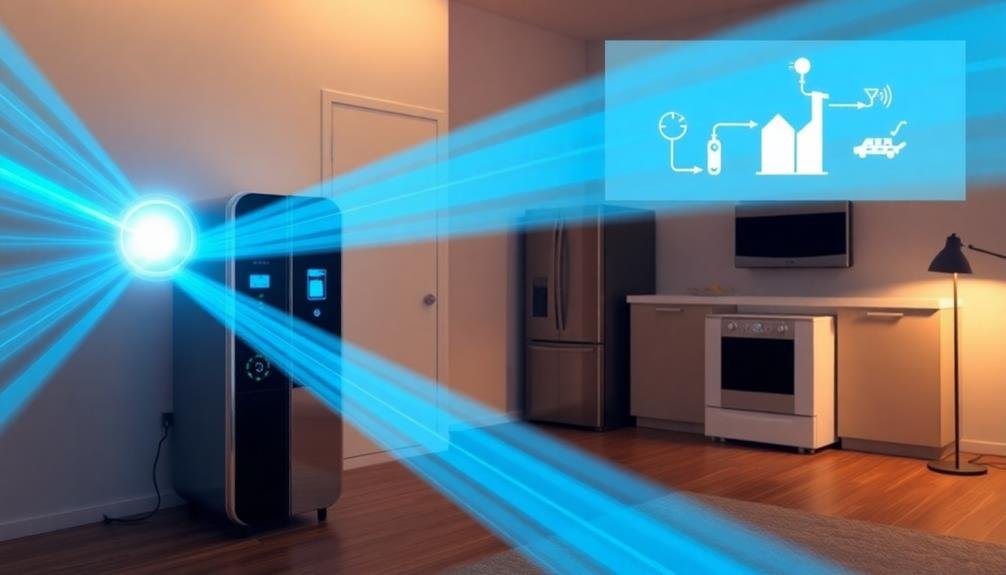
Fuel cells stand out as one of the most efficient energy conversion technologies available today. They directly convert chemical energy into electrical energy, bypassing the thermal conversion process used in traditional power generation. This direct conversion allows fuel cells to achieve efficiency rates of up to 60%, compared to the 35-40% efficiency of conventional power plants.
You'll find that fuel cells maintain their high efficiency across a wide range of power outputs, unlike other technologies that lose efficiency at partial loads. This makes them ideal for home energy storage, where power demands fluctuate throughout the day.
They're also quiet and produce minimal emissions, with water vapor being the primary byproduct.
When you integrate fuel cells with renewable energy sources like solar panels, you can create a highly efficient and sustainable home energy system. You'll be able to store excess energy as hydrogen, which can be converted back to electricity when needed.
This process allows you to maximize your energy utilization and reduce reliance on the grid, potentially leading to significant cost savings over time.
Clean and Quiet Operation
When it comes to home energy solutions, you'll find that fuel cells stand out for their clean and quiet operation. Unlike traditional generators, fuel cells produce electricity through an electrochemical process, eliminating the need for combustion. This means you won't have to deal with harmful emissions or air pollutants typically associated with fossil fuel-based systems.
You'll appreciate the near-silent operation of fuel cells, making them ideal for residential areas where noise pollution is a concern. They don't have moving parts, which contributes to their quiet nature and reduces maintenance needs. This feature allows you to run your fuel cell system at any time without disturbing your neighbors or disrupting your own peace and quiet.
The clean operation of fuel cells extends beyond air quality. They produce only water and heat as byproducts, which you can potentially use for other household purposes. This efficiency minimizes waste and maximizes resource utilization.
Additionally, fuel cells don't require toxic materials for operation, reducing environmental risks associated with storage and disposal. By choosing fuel cells for your home energy storage, you're opting for a solution that's not only efficient but also environmentally responsible and neighbor-friendly.
Reliable Backup Power Source

Beyond their clean and quiet operation, fuel cells excel as a reliable backup power source for your home. Unlike traditional generators, fuel cells can provide continuous power for extended periods, as long as they've a fuel supply. This makes them ideal for areas prone to prolonged power outages or natural disasters.
You'll appreciate the quick response time of fuel cells. They can start up within seconds of a power failure, ensuring minimal disruption to your household activities. Fuel cells also offer a consistent power output, maintaining a steady flow of electricity without fluctuations that could damage sensitive electronics.
Fuel cells don't require frequent maintenance like conventional backup generators. There are no moving parts to wear out, reducing the likelihood of mechanical failures. You can count on your fuel cell system to be ready when you need it most, without the hassle of regular servicing.
Additionally, fuel cells can integrate seamlessly with your existing power systems, including solar panels and battery storage. This versatility allows you to create a robust, multi-layered backup power solution that enhances your home's energy resilience and independence.
Reduced Dependency on Grid
Fuel cells can considerably reduce your home's reliance on the electrical grid, offering a path to energy independence.
You'll have a blackout-proof power supply, ensuring your home remains functional even during widespread outages.
Additionally, you can manage peak demand periods more effectively, potentially lowering your energy costs and reducing strain on the grid.
Energy Independence at Home
As homeowners seek greater control over their energy consumption, fuel cells offer a promising path to energy independence. With fuel cell technology, you can generate your own electricity on-site, reducing or even eliminating your reliance on the grid. This means you're no longer at the mercy of power outages or fluctuating energy prices.
Fuel cells provide a consistent and reliable source of power, operating 24/7 regardless of weather conditions. Unlike solar panels or wind turbines, they don't depend on sunlight or wind to function. You'll have a steady supply of electricity, even during extended grid outages or natural disasters.
By producing your own power, you'll also gain more control over your energy costs. You won't be subject to unexpected rate hikes or peak pricing periods imposed by utility companies. Instead, you can manage your energy production and consumption more efficiently, potentially leading to significant savings over time.
Moreover, fuel cells can integrate seamlessly with other renewable energy sources, creating a robust and diverse home energy system. This flexibility allows you to customize your energy solution to fit your specific needs and preferences, further enhancing your energy independence.
Blackout-Proof Power Supply
Guaranteeing a blackout-proof power supply is one of the most compelling reasons to invest in fuel cell technology for your home. Unlike traditional grid-dependent systems, fuel cells can operate independently, providing a reliable source of electricity even during power outages.
You'll enjoy uninterrupted power for essential appliances, lighting, and heating or cooling systems. Fuel cells convert chemical energy into electrical energy through a continuous process, as long as fuel is supplied. This means you're not reliant on the grid's stability or subject to its vulnerabilities.
During severe weather events, equipment failures, or other grid disruptions, your home remains powered. You'll also benefit from reduced strain on the electrical grid during peak demand periods. By generating your own electricity, you're less affected by brownouts or rolling blackouts that utilities might implement to manage high demand.
This self-sufficiency extends beyond short-term outages; with proper fuel storage, you can maintain power for extended periods. Investing in fuel cell technology for your home guarantees you're prepared for any power-related emergencies, providing peace of mind and enhanced resilience against grid failures.
Peak Demand Management
Peak demand management becomes a significant advantage when you incorporate fuel cells into your home energy system. These devices allow you to effectively manage your household's energy consumption during peak hours, reducing your reliance on the grid and potentially lowering your electricity bills.
With fuel cells, you can generate and store your own power, using it during high-demand periods when grid electricity is most expensive. This strategy helps you avoid peak pricing and reduces strain on the overall power grid.
You'll have the flexibility to run your appliances and electronics without worrying about time-of-use rates or grid capacity issues. Fuel cells also enable you to participate in demand response programs offered by utility companies.
These programs incentivize consumers to reduce their energy consumption during peak times, often through financial rewards. By using your fuel cell-generated power during these periods, you can contribute to grid stability while earning benefits.
Moreover, fuel cells' consistent power output allows for more precise load management. You can easily adjust your energy usage patterns to optimize efficiency and cost-effectiveness, giving you greater control over your home's energy consumption and expenses.
Long-Term Cost Savings
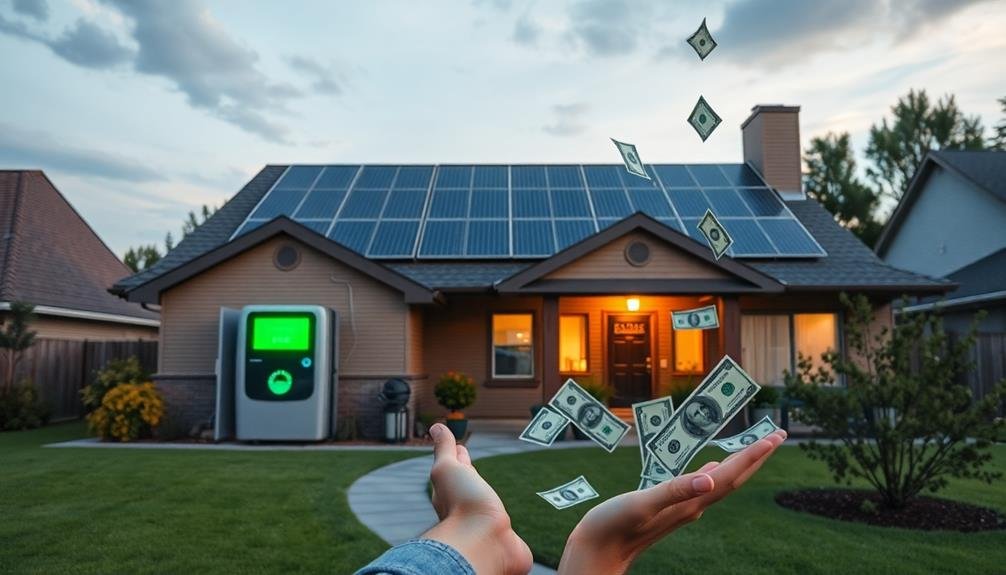
Over time, fuel cells for home energy storage can lead to substantial cost savings. You'll benefit from reduced electricity bills as you rely less on grid power, especially during peak hours when rates are highest. Fuel cells also have a longer lifespan compared to traditional batteries, meaning you'll spend less on replacements over the years.
Consider the following cost comparison:
| Cost Factor | Fuel Cells | Traditional Batteries |
|---|---|---|
| Initial Investment | Higher | Lower |
| Lifespan | 15-20 years | 5-10 years |
| Maintenance | Low | Moderate |
While the upfront cost of fuel cells may be higher, their durability and efficiency make them more economical in the long run. You'll also save on maintenance costs, as fuel cells have fewer moving parts and require less frequent servicing.
Additionally, fuel cells can increase your home's value. As energy-efficient technologies become more sought after, your property's marketability and resale value may improve. Some regions offer tax incentives or rebates for installing fuel cell systems, further offsetting your initial investment and accelerating your return on investment.
Scalability for Various Home Sizes
One of the key advantages of fuel cells for home energy storage lies in their scalability. You can easily adapt these systems to meet the energy needs of various home sizes, from small apartments to large family houses. This flexibility guarantees that you're not overpaying for unnecessary capacity or left with insufficient power storage.
Fuel cell systems can be customized based on your specific energy requirements, taking into account factors such as:
- Your home's square footage
- The number of occupants and their energy consumption habits
- The presence of high-energy appliances or electric vehicles
You'll find that fuel cell manufacturers offer a range of options to suit different home sizes and energy demands. For smaller homes, compact units can provide sufficient backup power without taking up too much space.
Larger residences may benefit from more robust systems or multiple units working in tandem. As your energy needs change over time, you can often upgrade or expand your fuel cell system without replacing the entire setup.
This scalability not only guarantees peak performance but also helps you avoid unnecessary costs associated with oversized or undersized energy storage solutions.
Integration With Renewable Sources
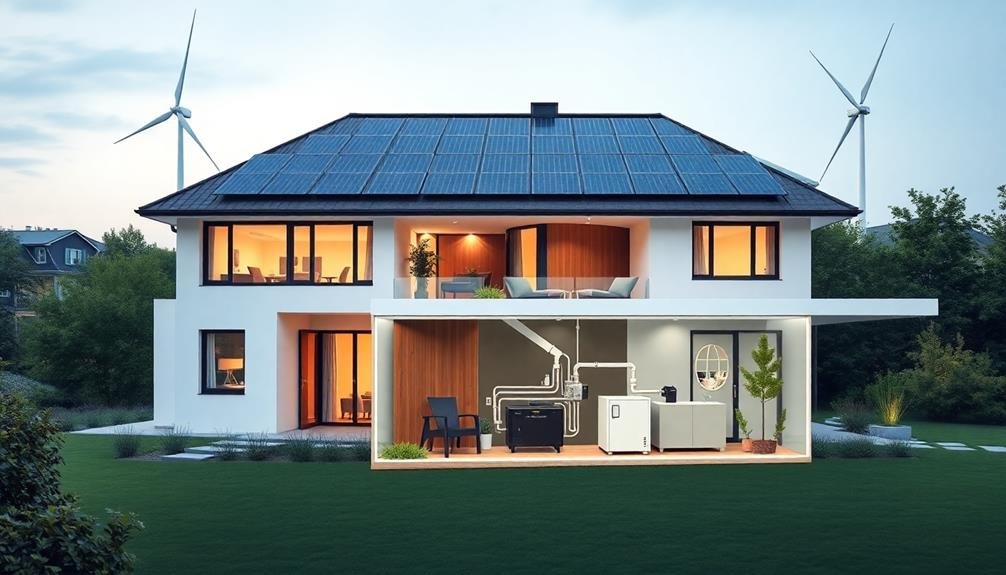
You'll find fuel cells pair exceptionally well with renewable energy sources, enhancing your home's energy independence.
Solar panels can produce hydrogen for fuel cells through electrolysis, creating a self-sustaining solar-hydrogen system.
Wind turbines can also integrate seamlessly with fuel cells in a microgrid setup, optimizing energy distribution and storage for your household needs.
Solar-Hydrogen Synergy
Fuel cells and solar energy systems frequently complement each other, creating a powerful synergy for sustainable home energy solutions. You'll find that combining these technologies can provide a more reliable and efficient energy source for your home.
Solar panels generate electricity during daylight hours, which can be used to power your home and produce hydrogen through electrolysis. This hydrogen is then stored and used in fuel cells to generate electricity when sunlight isn't available.
The solar-hydrogen synergy offers several benefits:
- Increased energy independence: You'll rely less on the grid, reducing your vulnerability to power outages and price fluctuations.
- Enhanced sustainability: By using renewable solar energy to produce hydrogen, you're creating a clean, closed-loop energy system.
- Improved energy storage: Hydrogen can be stored long-term without degradation, unlike traditional batteries.
You'll also appreciate the flexibility this system provides. During peak solar production, excess energy can be used to generate hydrogen for later use.
This approach maximizes your solar investment and guarantees a consistent power supply, even during extended periods of low sunlight or high energy demand.
Wind Power Compatibility
In addition to solar energy, fuel cells can seamlessly integrate with wind power systems to create a more robust and versatile renewable energy solution for your home. Wind turbines generate electricity when the wind blows, which can be used to power your home or charge batteries.
However, by pairing wind power with fuel cells, you'll have a more reliable and consistent energy supply. When wind speeds are high, excess electricity can be used to produce hydrogen through electrolysis. This hydrogen is then stored and later used in fuel cells to generate electricity during periods of low wind or high energy demand.
This integration helps smooth out the intermittent nature of wind power, ensuring you have a steady supply of clean energy. Moreover, fuel cells can help you maximize the potential of your wind power system. By storing excess energy as hydrogen, you're not limited by battery capacity and can capture more of the wind's energy potential.
This combination also reduces your reliance on the grid, potentially lowering your electricity bills and increasing your energy independence. The fuel cell-wind power synergy offers a flexible, efficient, and environmentally friendly approach to powering your home.
Microgrid System Optimization
A home's microgrid system can be optimized by integrating fuel cells with various renewable energy sources, creating a more efficient and resilient power network.
By combining fuel cells with solar panels, wind turbines, or other renewables, you'll enhance your energy independence and reduce reliance on the main grid. This integration allows for seamless power generation and storage, ensuring a constant supply of electricity even during outages or periods of low renewable production.
To optimize your microgrid system with fuel cells, consider the following:
- Use smart energy management systems to balance power generation and consumption
- Implement load-shifting strategies to maximize the use of renewable energy during peak production times
- Incorporate energy storage solutions like batteries to complement fuel cells and store excess renewable energy
Fuel Flexibility Options
Exploring the versatility of fuel cells reveals a range of fuel flexibility options for home energy storage systems. You'll find that fuel cells can operate on various fuel sources, giving you more choices for powering your home. The most common options include hydrogen, natural gas, and propane.
Hydrogen fuel cells offer the cleanest operation, producing only water as a byproduct. Natural gas fuel cells are popular due to existing infrastructure, while propane fuel cells provide an excellent off-grid solution. Each fuel type has its advantages and considerations:
| Fuel Type | Advantages | Considerations |
|---|---|---|
| Hydrogen | Zero emissions | Storage challenges |
| Natural Gas | Readily available | CO2 emissions |
| Propane | Portable | Higher cost |
You can choose the fuel type that best suits your needs and local availability. Some fuel cell systems even allow for fuel switching, enabling you to adapt to changing circumstances or fuel prices. This flexibility guarantees that your home energy storage system remains viable and efficient in the long term, regardless of shifts in the energy landscape or your personal preferences.
Environmental Impact and Sustainability
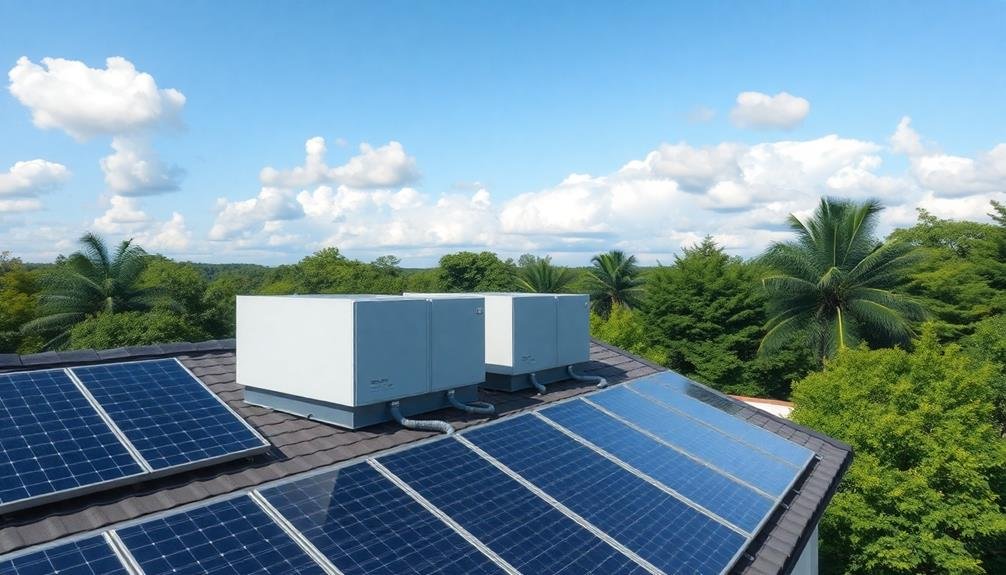
While fuel cells offer promising benefits for home energy storage, it's crucial to evaluate their environmental impact and sustainability. Fuel cells generally produce fewer emissions than traditional power sources, especially when using hydrogen as fuel. They're highly efficient, converting chemical energy directly into electricity without combustion, resulting in lower overall emissions.
When considering fuel cells for your home, you'll want to focus on these key environmental aspects:
- Carbon footprint: Fuel cells produce minimal greenhouse gases during operation, particularly when using renewable hydrogen sources.
- Air quality: They emit only water vapor and heat, contributing to improved local air quality compared to fossil fuel-based systems.
- Resource consumption: Fuel cells require less water and land use than many other energy technologies, reducing their overall environmental impact.
The sustainability of fuel cells depends largely on the source of hydrogen. While hydrogen production can be energy-intensive, advancements in renewable hydrogen production methods are making fuel cells increasingly sustainable.
Frequently Asked Questions
How Long Does It Take to Install a Fuel Cell System?
You'll find that fuel cell system installation typically takes 1-3 days. It depends on your home's setup and the system's size. Professionals will handle the process, including electrical connections and safety checks, to guarantee everything's properly installed.
Are There Any Safety Concerns With Using Fuel Cells at Home?
You should be aware of potential safety concerns with home fuel cells. They include hydrogen leaks, electrical hazards, and overheating. However, modern systems have built-in safety features, and proper installation and maintenance greatly reduce these risks.
What Maintenance Is Required for a Home Fuel Cell System?
You'll need to perform regular inspections, replace filters, and check for leaks. You should also clean the system periodically and monitor its performance. It's best to have a professional technician conduct annual maintenance to guarantee peak operation.
Can Fuel Cells Power All Home Appliances, Including High-Energy-Consuming Devices?
Yes, fuel cells can power all your home appliances, including high-energy devices. They'll provide consistent electricity for everything from your refrigerator to your air conditioner. You'll have reliable power for all your household needs without interruption.
How Do Fuel Cells Compare to Other Home Energy Storage Options?
You'll find fuel cells offer several advantages over other home energy storage options. They're cleaner, more efficient, and provide continuous power. Unlike batteries, they don't degrade over time and can operate independently of the grid.
In Summary
You've seen the many benefits of fuel cells for home energy storage. They're efficient, clean, and reliable, offering independence from the grid and long-term savings. You can scale them to fit your home and integrate them with renewables. With fuel flexibility and minimal environmental impact, fuel cells are a sustainable choice. As you consider your energy future, remember that fuel cells can provide a powerful, versatile solution for your home's power needs.

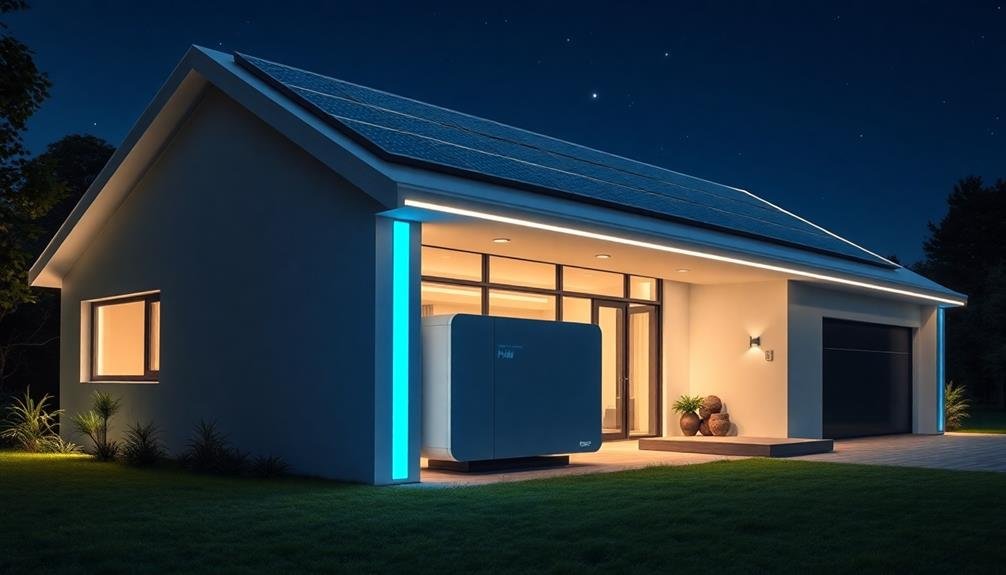

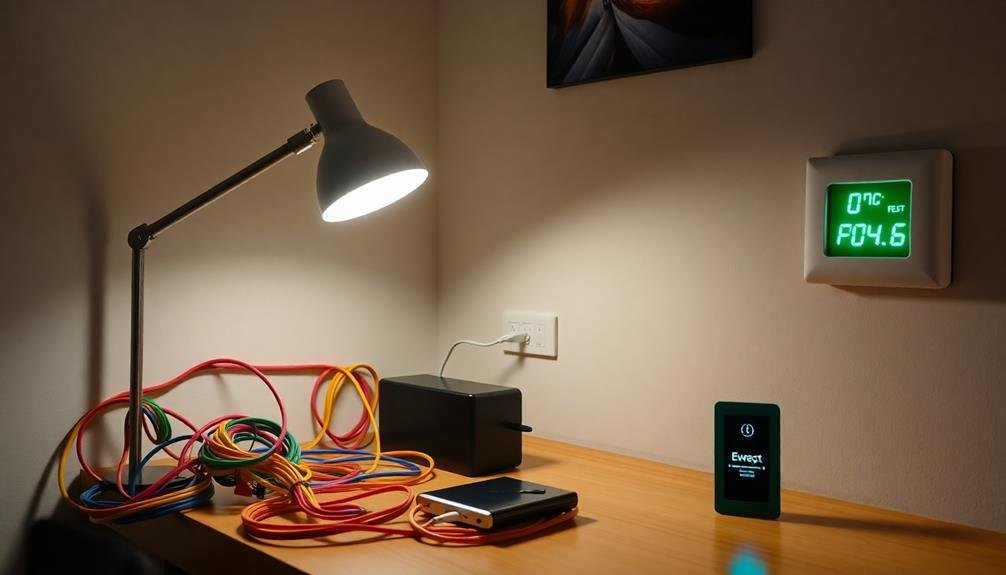

Leave a Reply